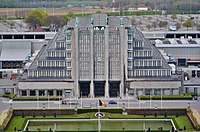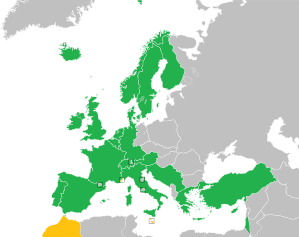Eurovision Song Contest 1987
The Eurovision Song Contest 1987 was the 32nd Eurovision Song Contest and was held on 9 May 1987 in Brussels, Belgium after Sandra Kim's win the previous year. The presenter was Viktor Lazlo. She agreed to present the Eurovision Song Contest, on the condition she was allowed to open with a song of her own, "Breathless". Johnny Logan was the winner for Ireland with his own composition "Hold Me Now". That made him the first (and as of 2020 only) performer to win the contest twice, as he had won also in 1980.
| Eurovision Song Contest 1987 | |
|---|---|
 | |
| Dates | |
| Final | 9 May 1987 |
| Host | |
| Venue | Palais du Centenaire Brussels, Belgium |
| Presenter(s) | Viktor Lazlo |
| Conductor | Jo Carlier |
| Directed by | Jacques Bourton |
| Executive supervisor | Frank Naef |
| Host broadcaster | Radio-Télévision Belge de la Communauté Française (RTBF) |
| Opening act | "Breathless" performed by Viktor Lazlo |
| Interval act | Marc Grauwels |
| Website | eurovision |
| Participants | |
| Number of entries | 22 |
| Debuting countries | None |
| Returning countries | |
| Non-returning countries | None |
Participation map
| |
| Vote | |
| Voting system | Each country awarded 12, 10, 8–1 point(s) to their 10 favourite songs |
| Nul points | |
| Winning song | "Hold Me Now" |
Location

Brussels is the capital city of Belgium. The Brussels Capital Region is part of both the French Community of Belgium[1] and the Flemish Community,[2] but separate from the regions of Flanders and Wallonia.[3][4]
The contest took place at the Palais du Centenaire, a set of exhibition halls built from 1930 to celebrate the centenary of the independence of Belgium in Heysel Plateau (Heysal Park). The Centenary Palace (French: Palais du Centenaire, Dutch: Eeuwfeestpaleis) is one of the remaining buildings of the World's Fair of 1935. Currently it is still being used for trade fairs.
Format
Host broadcaster
Initially, the competition was to be jointly organised by the two Belgian public broadcasters: the French-speaking Radio Télévision Belge Francophone (RTBF) and the Dutch-speaking Belgische Radio- en Televisieomroep (BRT). The aim was to give Belgium the image of a united country. But quickly, disagreements appeared between the two broadcasters, especially on the place, the presenters and transmission of the contest. BRT eventually withdrew from the project and RTBF organised the contest alone.[5] The necessary budget was so important that a new law had to be adopted, allowing the use of advertising to finance the Belgian public channels. This was the first time that sponsors helped to produce the contest and appeared on screen.[6] BRT was in charge of the selection of the Belgian entry for the contest, as in all other odd-numbered years.
Contest overview
The 1987 Eurovision was the biggest contest at that time, with 22 countries taking part. Only Malta, Monaco and Morocco failed to compete out of all the countries which had entered the contest in the past. Due to the number of countries, and the time it took for the contest to be held, the EBU set the limit of competing countries to 22. This became problematic over the next few years as new and returning nations indicated an interest in participating, but could not be accommodated.[7]
Controversy erupted in Israel after their song was selected, "Shir Habatlanim" by the Lazy Bums. The comedic performance was criticised by the country's culture minister, who threatened to resign should the duo proceed to Brussels. They went on to perform for Israel, placing eighth; however the culture minister's threat was left unfulfilled.[7]
Conductors




.svg.png)











.svg.png)



.svg.png)

Results
Notes
- 1.^ Contains some phrases in English.
Score sheet
| Juries | ||||||||||||||||||||||||
|---|---|---|---|---|---|---|---|---|---|---|---|---|---|---|---|---|---|---|---|---|---|---|---|---|
| Norway | 65 | 4 | 7 | 10 | 7 | 3 | 4 | 4 | 7 | 3 | 5 | 3 | 2 | 6 | ||||||||||
| Israel | 73 | 2 | 1 | 5 | 6 | 4 | 10 | 3 | 4 | 10 | 8 | 7 | 5 | 8 | ||||||||||
| Austria | 8 | 1 | 7 | |||||||||||||||||||||
| Iceland | 28 | 4 | 4 | 4 | 6 | 10 | ||||||||||||||||||
| Belgium | 56 | 5 | 2 | 3 | 6 | 7 | 4 | 5 | 8 | 4 | 5 | 3 | 4 | |||||||||||
| Sweden | 50 | 12 | 8 | 1 | 3 | 7 | 2 | 3 | 7 | 7 | ||||||||||||||
| Italy | 103 | 3 | 6 | 3 | 5 | 1 | 12 | 12 | 8 | 4 | 1 | 12 | 1 | 4 | 12 | 12 | 7 | |||||||
| Portugal | 15 | 8 | 5 | 2 | ||||||||||||||||||||
| Spain | 10 | 10 | ||||||||||||||||||||||
| Turkey | 0 | |||||||||||||||||||||||
| Greece | 64 | 1 | 2 | 6 | 8 | 5 | 7 | 5 | 7 | 12 | 6 | 5 | ||||||||||||
| Netherlands | 83 | 5 | 2 | 10 | 5 | 7 | 3 | 8 | 3 | 12 | 2 | 2 | 6 | 8 | 10 | |||||||||
| Luxembourg | 4 | 2 | 2 | |||||||||||||||||||||
| United Kingdom | 47 | 10 | 5 | 3 | 5 | 3 | 3 | 1 | 2 | 1 | 4 | 3 | 2 | 5 | ||||||||||
| France | 44 | 1 | 4 | 5 | 4 | 1 | 12 | 5 | 10 | 2 | ||||||||||||||
| Germany | 141 | 3 | 8 | 10 | 12 | 10 | 7 | 4 | 5 | 1 | 6 | 10 | 6 | 10 | 6 | 6 | 10 | 12 | 7 | 7 | 1 | |||
| Cyprus | 80 | 6 | 6 | 2 | 12 | 2 | 6 | 5 | 3 | 6 | 10 | 8 | 10 | 4 | ||||||||||
| Finland | 32 | 10 | 3 | 4 | 2 | 1 | 8 | 2 | 1 | 1 | ||||||||||||||
| Denmark | 83 | 7 | 6 | 7 | 7 | 8 | 2 | 1 | 1 | 8 | 6 | 7 | 8 | 8 | 4 | 3 | ||||||||
| Ireland | 172 | 8 | 4 | 12 | 12 | 12 | 12 | 8 | 10 | 10 | 12 | 10 | 12 | 1 | 6 | 8 | 12 | 5 | 6 | 12 | ||||
| Yugoslavia | 92 | 12 | 7 | 8 | 10 | 8 | 6 | 6 | 12 | 2 | 2 | 10 | 8 | 1 | ||||||||||
| Switzerland | 26 | 1 | 2 | 5 | 7 | 3 | 4 | 1 | 3 | |||||||||||||||
12 points
Below is a summary of all 12 points in the final:
|
|
Returning artists
| Artist | Country | Previous year(s) |
|---|---|---|
| Gary Lux | 1983 (member of Westend), 1985 | |
| Alexia | 1981 (member of Island) | |
| Wind | 1985 | |
| Johnny Logan | 1980 (winner) |
Commentators
TelevisionParticipating countries
Non-participating countriesRadioSome participating countries did not provide radio broadcasts for the event; the ones who did are listed below.
Spokespersons
National jury members
Possible Soviet Union participationIn 2009, Eduard Fomin, a former employee of the Ministry of Education of the RSFSR, revealed that in 1987 George Veselov, the Minister of Education for the Soviet Union, brought forward the idea of a participation of the Soviet Union at the Eurovision Song Contest due to the number of political reforms made by the Soviet General Secretary Mikhail Gorbachev during the late 1980s. The idea was mainly a political one, with the thought that a win in the contest for the Soviet Union would impact on the relationships between the Soviet Union and the capitalist countries of the west. Valery Leontyev was suggested as a name for the Soviet Union's first participation, however Veselov's ideas were not shared by the Communist Party of the Soviet Union, or by Gorbachev himself, believing it to be too radical a step to take, and so no Soviet participation was ever made.[37] Ten former republics of the Soviet Union would later compete in the contest on their own in the 1990s and 2000s: Russia, Estonia, Lithuania, Latvia, Ukraine, Belarus, Moldova, Armenia, Georgia, and Azerbaijan, with five of the countries going on to win the contest. See alsoReferences
External links
|

